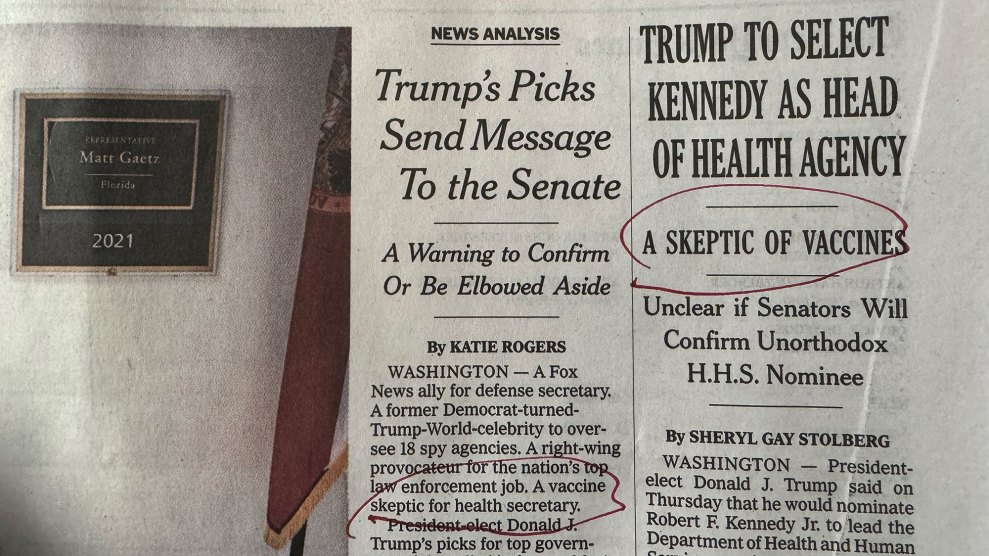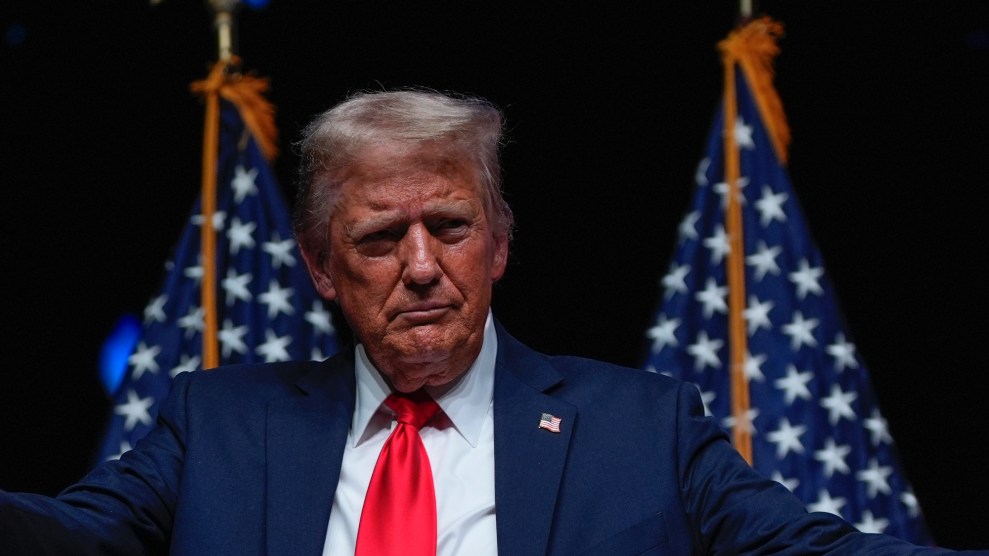
The below article first appeared in David Corn’s newsletter, Our Land. The newsletter comes out twice a week (most of the time) and provides behind-the-scenes stories and articles about politics, media, and culture. Subscribing costs just $5 a month—but you can sign up for a free 30-day trial.
Shortly after Donald Trump narrowly beat Kamala Harris, Politico, the all-politics-all-the-time news outlet, invited readers to participate in a contest: Predict Trump’s cabinet appointees. Whoever did best would walk away with assorted Politico swag. A convicted felon and deceitful demagogue who four years ago incited an attack on the Capitol and tried to overthrow American democracy—a man described as a “fascist” by retired generals who worked with him—is returning to power and bringing with him to the White House a fistful of threats, including vows to suppress the media. But we can have fun, right? Pin the tail on the Trump appointees and win prizes!
This was a stupid and small move that received scant public attention. But it symbolizes a shift in the media, as news outfits figure out how to contend with the new order. Too many, I’m afraid, will either purposefully choose or drift toward an accommodationist stance. I recently heard about the leaders of one online site that previously published hard-hitting stories on Trump and his allies informing their staff that it must pivot with Trump back in the White House. And it’s long been true that mainstream news organizations, particularly network television, have had to reach a modus vivendi with a White House to get the exclusive interviews and video footage they crave. That can be expected once again.
My hunch is that a line will form across the media landscape between those entities that cover the Trump crowd in a relatively normal fashion—What is the president thinking? What are his advisers telling him? What is happening between the White House and Congress? What’s the latest palace intrigue? Who’s invited to the state dinner? What do the polls say?—and those who view as the overarching story the profound threat of authoritarianism posed by Trump and his henchmen and henchwomen. Do the usual political stories matter as much if Trump moves ahead with plans to deport millions and to place in power assorted extremists? Or if he moves to undermine democracy?
Within days of Trump’s announcement that he will nominate Robert F. Kennedy Jr. to head the Department of Health and Human Services—one of his most absurd and dangerous picks—legacy media were downplaying the peril of a Kennedy appointment. On social media NPR reported, “RFK Jr. wants to tackle chronic disease. Despite controversial views on vaccines, his focus on healthy food and taking on special interests may find broad support—and face political headwinds.”
The New York Times repeatedly referred to Kennedy as merely a “vaccine skeptic.” As did CNN. Controversial views? Skepticism? Describing Kennedy as a vaccine skeptic with unconventional views is a form of sanewashing. That’s rather value neutral and, more important, highly inaccurate. Kennedy is a promoter of debunked conspiracy theories that are bonkers. (Here’s one I examined.) And he is not a skeptic of vaccines; he is an anti-vaxxer who has said no vaccine is safe or effective. Not one. This fellow has declared he wants to place all new drug development on hold for eight years. That means no new medications for cancer, Alzheimer’s, Parkinson’s, diabetes, heart disease, and everything else. He is a radical, and if he’s allowed to turn his “controversial views” into policy, millions of Americans could suffer.
One media trait is an aversion to repetition. News is what’s new, right? We already reported that.
This somewhat respectful treatment of Kennedy is but one example. Look at how the New York Times characterized several of Trump’s other bizarre appointments: “Trump Takes on the Pillars of the ‘Deep State.’” The paper reported, “The Justice Department, Pentagon and intelligence agencies were the three areas of government that proved to be the most stubborn obstacles to Mr. Trump in his first term.” This presentation gives weight to Trump’s conspiratorial claim there’s a diabolical Deep State that has been arrayed against him. Worse, it portrays government agencies that tried to hold Trump accountable for alleged wrongdoing as obstructionist. Meanwhile, the Washington Post is holding a 2024 Global Women’s Summit featuring Kellyanne Conway, a Trump adviser, and Lara Trump, the GOP co-chair and Trump daughter-in-law—two women who are part of Trump’s inner circle. I assume that Jeff Bezos’ newspaper is hoping to financially profit from this conference—being conducted in partnership with Tina Brown Media—and figure it needs Trump and Conway to help them succeed. Does democracy die at fancy confabs that celebrate enablers of autocracy?
Trump’s thin victory in 2024 ought not wipe the slate clean. He remains a thug who refused to accept election results not in his favor, encouraged political violence, amplified foul conspiracy theories of various stripes, lied nonstop to spread fear, hatred, and paranoia, demonized his foes as “the enemy within,” expressed admiration for Hitler’s generals, and proposed terminating the Constitution, placing critics in front of military tribunals, prosecuting his detractors, and even executing one of them. One media trait is an aversion to repetition. News is what’s new, right? We already reported that. But if Trump’s far-reaching offenses are not repeatedly centered in media coverage of him, the press will be accomplices to Trump’s perilous perversion of American politics.
No doubt, there will be the occasional wonderful exposé of Trump’s perfidy in the New York Times, the Washington Post, and elsewhere. But the big media institutions—mostly for-profit corporations with eyes keenly trained on the bottom line—will look to play ball with the Trump crew or, at least, cover it in business-as-usual fashion, even as Trump pummels them as the “enemy of the people.” The billionaire owner of the Los Angeles Times, Patrick Soon-Shiong, who caused a fuss by blocking the paper’s editorial board from endorsing Kamala Harris for president, this past week said that he wants to redo the “entire” paper to make sure “voices from all sides” are heard and the news is “just the facts.” He didn’t say much more to indicate whether this means a kinder approach to Trump and the land of MAGA. Yet that seemed the message.
The gravitational pull within this business encourages normalizing politicians and officials and eschewing evaluation and rendering judgments.
There are other media-related concerns as we approach Trump 2.0. As demonstrated in the past fortnight, Trump’s style is to wield a firehose of multiple outrages, realizing that it’s tough to track each and every one of his transgressions in such a blitz. I fear as he mounts his assault on good government and decency during his presidency, there will be too many misdeeds to follow. There won’t be enough journalists to cover all his villainy and its consequences—neither at the local nor the national levels. The media industry has been decimated in the past two decades, with a sharp decline in news reporters on the beat. Having fewer watchdogs allows grifters, miscreants, and outright crooks to get away with more wrongdoing. CNN reportedly intends to impose wide-ranging staff cuts, including dumping producers who work with reporters and correspondents. If this happens, the network will diminish its capacity for reporting. And Comcast is reportedly considering spinning off MSNBC, which would disconnect it from NBC News and perhaps weaken the network. (Interest declared: I am an MSNBC commentator.)
After the 2024 election—during which Trump was too frequently treated as a regular candidate by the press and his endless deployment of false narratives often not highlighted—I’m not confident that the American media is up to the task of covering a second Trump administration and all the potential damage it can cause. The gravitational pull within this business encourages normalizing politicians and officials and eschewing evaluation and rendering judgments. Trump is a disinformation machine and a threat to democracy. But will these be the central narratives of the mainstream coverage of his second presidency? Can the media maintain the main plot: Trump presents a danger? Already I sense a degree of acquiescence within certain media quarters that signals an acceptance of Trump to the public.
The powerhouse news outfits should not declare themselves a wing of the resistance to Trump. That is not their job. As Marty Baron, the former Washington Post editor once said, “We’re not at war with the [Trump] administration, we’re at work.” But in the Trump era, the press ought to think hard about what that work entails and not apply routine White House coverage to Trump and his gang, especially as Trump looks to limit press freedoms and continues his war on democratic norms and protections. Here’s my suggestion: not resistance, but not acceptance. The public needs constant reminders and reports on the Trump crowd’s authoritarian plans, extremist policies, and grifting schemes. These are not conventional times; they require unconventional coverage. The weeks, months, and years ahead will test all of us—voters, opposition politicians, and thought leaders—and the press, perhaps more so than most. If the media rolls over for Trump and his troops, that will make it far easier for Trump to roll over American democracy.


















